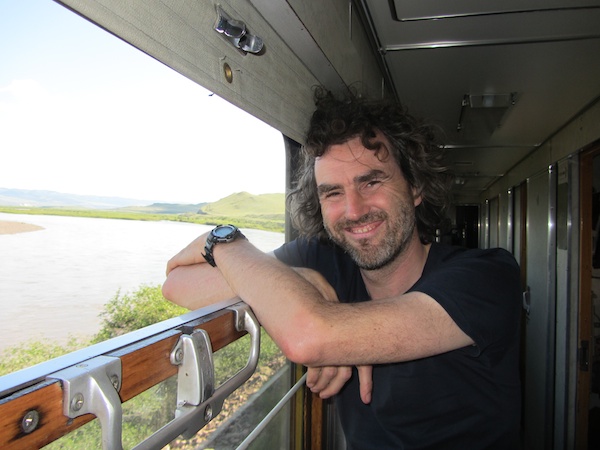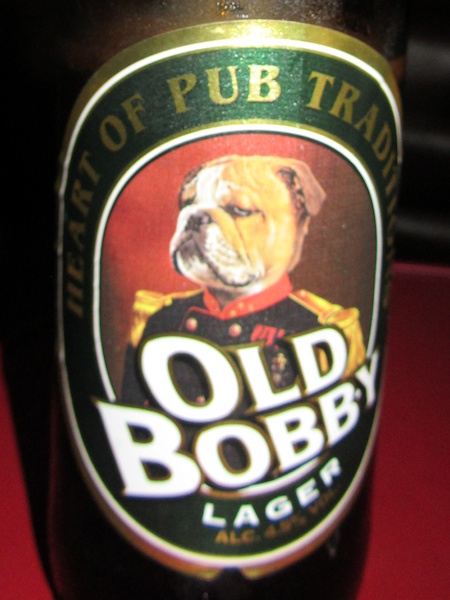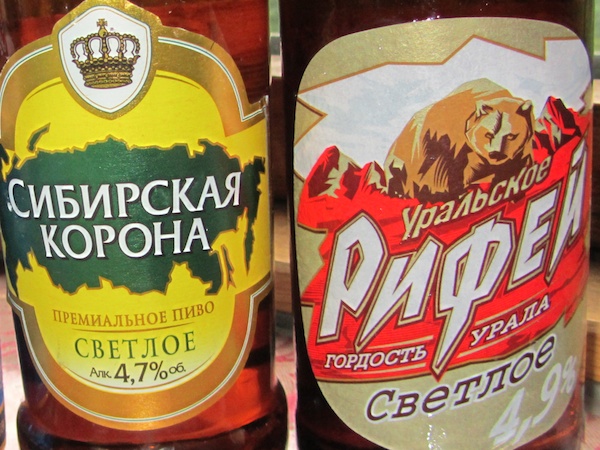We only need to board our pre-booked compartment on the Trans-Siberian Express, but our driver insisted on coming into Moscow train station with us and waiting until our platform had been announced. This took a while, so we hung around outside the station bar and sank a few Lowenbrau beers and tried to make conversation with him in pidgin Russian and French. By the time the Trans-Siberian rolled in, we were rolling a bit ourselves.
As we walked the length of the train, looking for our assigned carriage, we noticed that standing in each doorway was a pair of Mongolian conductresses, each smartly dressed in a white shirt and a blue skirt, sometimes a very short blue skirt.
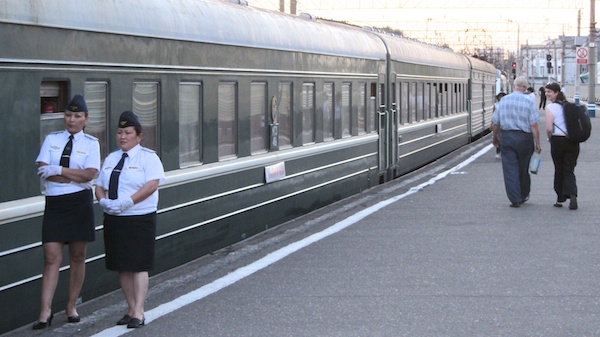
We found our compartment, which was officially a four-berth but, because we’d paid for first class, there will only be two of us in it. It’s a tiny little space but our home for the next week or so. The train shook itself and then moved slowly out of Moscow station, destination Ulaanbaatar in Mongolia and then Beijing in China, six thousand kilometres on the longest railway line in the world. I stuck my head out of the window and howled; I am on the Trans-Siberian Express!
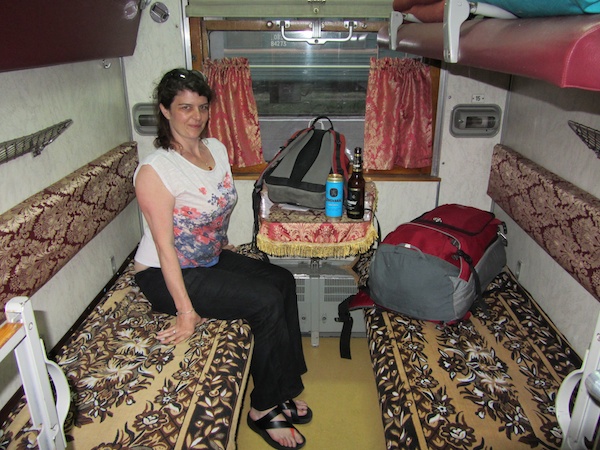
Our carriage is full of travellers, we have Chileans and French on either side. As night fell, all six of us got amazingly sloshed on canned Tuborg from the restaurant car which is an arduous nine carriages away.
The next morning, we started to learn a few of the features of this train. Each carriage has a ladies’ and a gents’ toilet, but the gents’ on our carriage isn’t working. I tried to use the gents’ in the next carriage, but was firmly turned away by the conductress there, so our carriage’s toilet is now effectively unisex. Either way, it has no toilet paper, but luckily we brought some with us.
At the end of each carriage is a wood-fired samovar, tended by the conductress, which provides hot water for drinks. Although we did bring coffee and a press, there is no crockery or cutlery, and we didn’t think to bring any with us. However, with the aid of a pair of nail-scissors, we managed to fashion a flimsy coffee cup out of the base of a water bottle.

Corridor party 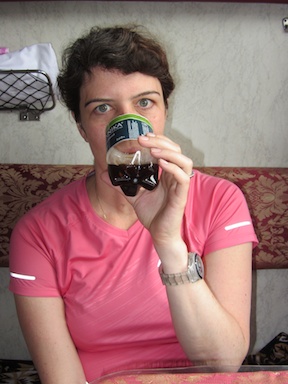
Impromptu coffee cup (or wine glass)
Along each corridor is a red woollen carpet, nailed to the wooden floor with long brass tacks that keep popping out. The conductress endlessly patrols this carpet, either sweeping it or hammering the tacks back in. I’ve already trodden on one of those tacks, which leaked blood everywhere, but worse than that the carpet sheds little pieces of red wool which get into every crevice of your luggage and which pile up in little drifts on the floor of each compartment.
On our first morning, we made the long trip to the restaurant car for breakfast. We gathered that although this particular train consists of Mongolian rolling stock (and therefore Mongolian staff), the restaurant car gets changed when we cross borders. Since we are still in Siberia, the restaurant car is Russian, but will be exchanged for a Mongolian one at the border town of Naushki. We sat down to a pleasant dish of potatoes fried with dill and garlic, with a side of pickled cucumbers, plus our own pressed coffee in a borrowed water glass.
At about lunchtime, the train pulled in to a station. It looked pretty quiet and desolate, but we got out anyway to stretch our legs. Suddenly there was an explosion of elderly ladies, sprinting across the tracks and ducking under trains, carrying trays of fresh vegetables, fresh fruit, smoked fish, bread, and even cling-filmed plates of fresh hot food. I bought some freshly roasted chicken with boiled potatoes, and Bronwyn scored a couple of salted gherkins from a plastic bucket. We also managed to buy some sturdier soft drink bottles so that we could make better coffee cups. Just about everything cost 100 roubles (about two English pounds) per item. The chicken tasted superb, far less bland than the stuff sold in Western supermarkets, and the potatoes were wonderful.
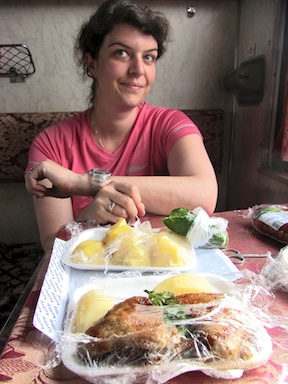
Bronwyn and some freshly roasted chicken 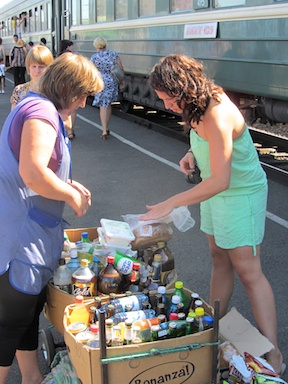
Karla works on keeping her fluids up
All this time, we had been chugging across a rather monotonous flat Siberian landscape of birch, pine, and the occasional open field. At the base of the Urals, our old engine was exchanged for a new one. We started to climb, but slowly. Were the birches looking a little thinner?
The trees thinned out into grasslands. Occasionally we passed a rock-crushing plant or train repair yard, and now and again a village of wooden houses. There were no signs of crops apart from some extensive market gardens behind some of the houses, and – very occasionally – some hay ricks, although it wasn’t clear what the hay was for, as we didn’t see any farm animals.
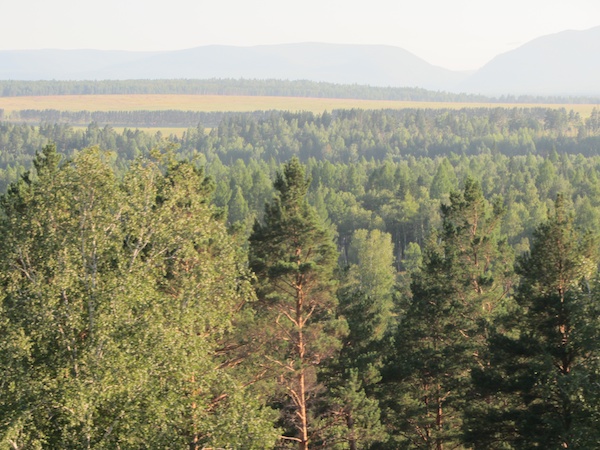
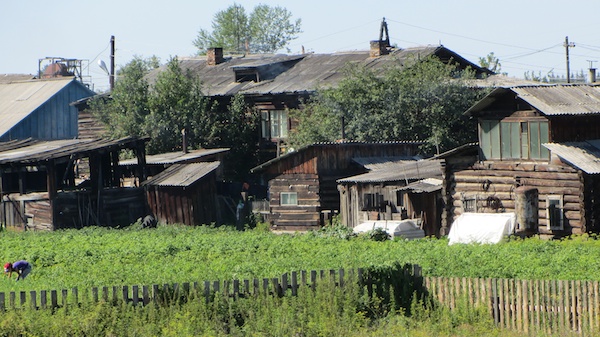
The Trans-Siberian isn’t really about the outside world, it’s all about the microcosm that is the train, and it didn’t take long for us to fall into its rhythm. In the morning, after sweeping out the night’s accumulation of red dust-balls, we’d hang out in our compartment and catch up on our reading. During the day, we’d hang out of the window and watch the world go by. Occasionally a freight train would trundle past on the other track. We’d snack on yesterday’s left-overs and wait patiently for the next stop, where we would leap out and grab meat, beer, ice cream, whatever was being sold by the ladies on the platform. In the afternoon, we would entertain visitors (our largely empty carriage was always popular with people travelling second class). In the evenings, we would party.
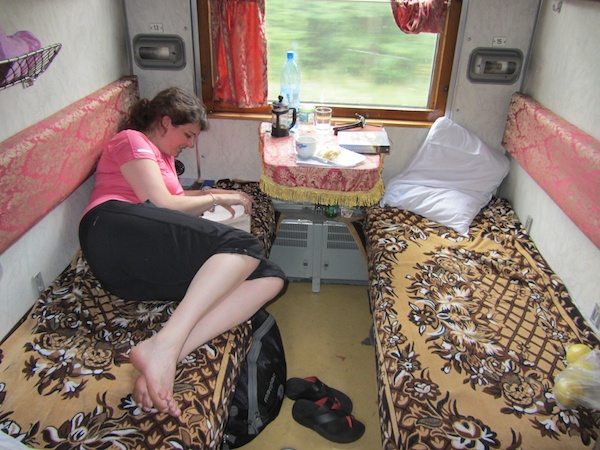
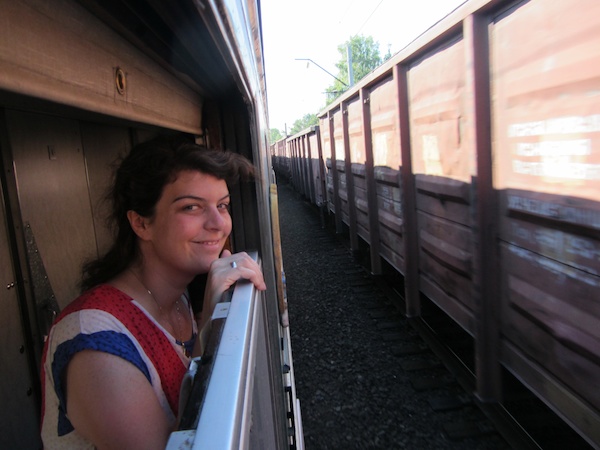
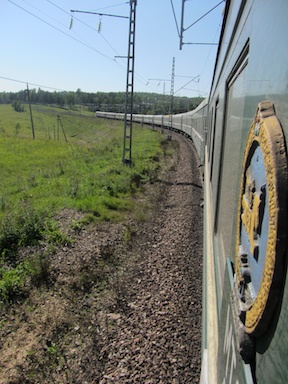
Onward, ever onward 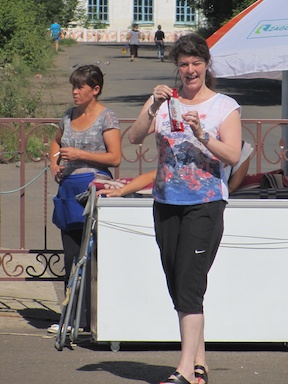
Bronwyn scores ice cream!
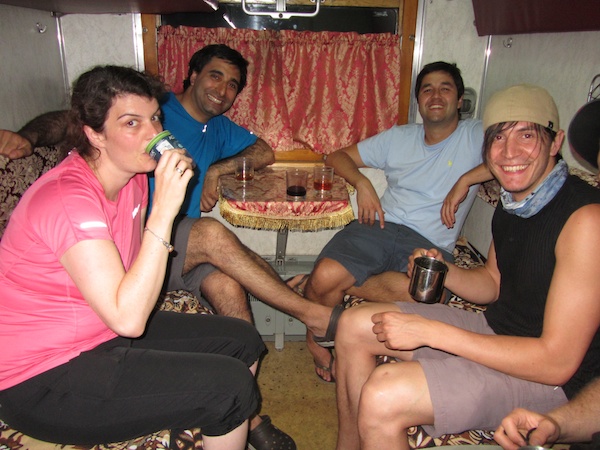
And then, one night, near the tail end of an exceptionally good party, our compartment suddenly filled with armed police who confiscated our passports and made Bronwyn pour all our glasses down a sink. Then they took away our few remaining bottles of booze, including a rather expensive bottle of French wine that I had in my luggage for a special occasion. It was all a bit of a surprise, and since we didn’t have any languages in common, somewhat mysterious.
A few days later, they returned with an interpreter, who attempted to explain. It seems that each train has a contingent of police who live in one of the rear carriages. They told some story about us keeping other guests awake, but since the party had extended the full length of our carriage and included not only everyone in every compartment but also some people from other carriages, we could only infer that we were keeping our conductress awake and that she had made a complaint. At any rate, they gave us our passports back, suggested that we should party in the restaurant car instead of our carriage, and said that my special wine bottle would be returned to me when we arrived in Ulan Bator.
That night, we all went to the restaurant car and drank them out of beer. The two elderly Russian ladies who ran the restaurant shuffled calmly to their supply fridge and re-stocked. These ladies were great, they were everybody’s great-grandmother, fussing around the tables in their flowered dresses and permed hair. In the day, they liked to sit in the corner and snooze, and by night they slept on the floor of the restaurant. Before long we were clearing up the glasses for them, and when we’d finished the second cabinet-full of beer, we waved them to stay seated and just helped ourselves directly from the supply fridge while they smiled and waved their gratitude. We’d been drinking some fairly boring lager up until now, but I found a whole cache of more interesting beers in a back corner of the supply fridge, which was nice.

One peculiar thing about the train is that it always keeps Moscow time regardless of the fact that it traverses seven time zones. This means that the concepts of ‘breakfast’ and ‘dinner’ drift considerably from the day outside; midday outside now corresponds to about six in the morning train time, which introduces a certain amount of jet-lag (train-lag?) in the staff. After a while, we realised that the two ladies were nodding off, so we bought some more beers and left them to make up their beds on the floor. We didn’t want to have a repeat of the police fiasco, so rather than returning to our carriages, we decided to party in the tiny space between the restaurant carriage and the rest of the train. That worked too.
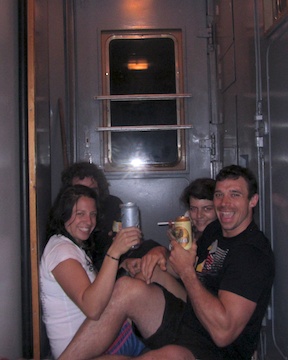
Party in the corridor of the restaurant car 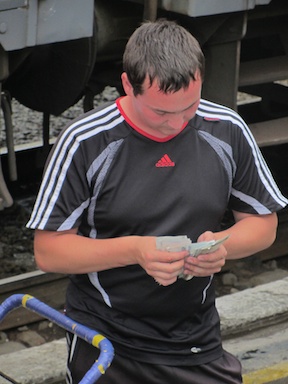
This platform beer-seller was happy to see us
One of the few real towns was Omsk, which seemed large and prosperous, and had actual kiosks on the platform instead of mobile vendors. We bought hot chicken and bananas and thought we’d have a quick look around the town, but there were armed police everywhere who were preventing passengers from leaving the platform. In fact it was here and at another station close to Irkutsk that we realised that many of the platform vendors weren’t locals at all, they were actually travelling on our train with us, and hopping off at the stations to sell goods to the locals. In the stations with a heavy police presence, they simply sold clothing and plastic goods out of the train windows.
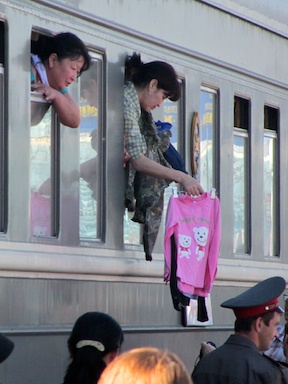
T-shirt, madam? 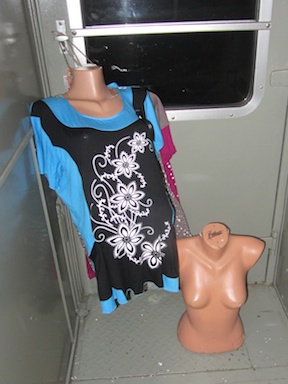
On-train advertising display
Suddenly a lot of things fell into place. I had wondered at the purpose of all these tiny little communities in the wilds of Siberia. What were these people doing out here? But now I realised that it is the train that is their raison d’être, without the train there would be no people. It is a nine thousand kilometre linear village, which has sprung up alongside the necessity to ship ore from one side of this enormous country to the other.
Many of our fellow travellers disembarked at Lake Baikal, but we had some deadlines to stick to so we stayed on board. We’ll see the world’s deepest freshwater lake on another occasion.

We likewise passed through Ulan Ude, which seemed to be a pleasant and prosperous city. Scattered amongst the Soviet-era apartment blocks were smart new houses, and closer to the tracks were the same kind of wooden home that we have seen all the way across Siberia, each with its own market garden packed with vegetables and fruit.
The railway here is also lined with lock-up garages. Some of them appear to be derelict, but others have been fitted with chimneys and new roofs. Do people live in them, or do the owners keep a fire burning to keep the cars from freezing in winter? We could not tell.
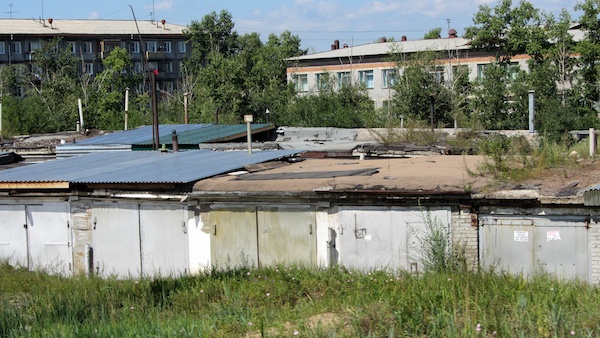
Brightly coloured paintwork was common on private houses. I was amused to see that the most common colours were pale blue and pale green, both of a shade usually to be found only on railway stations, signal boxes and signal poles.
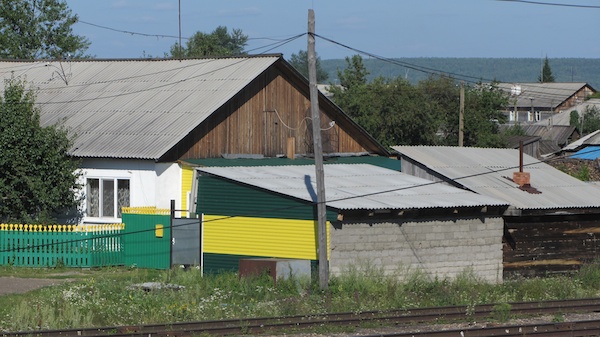
We got a new engine for the final run down into Ulan Bator, this time a smoky diesel. Close now to the Mongolian border, the terrain changed completely. The railway lifted up onto an embankment as it followed a small river that wound its way through an old flood-plain, with a small range of hills rising up on either side. The flat plain was purple with heads of wild garlic, but it was the scent of a badly tuned diesel that drifted in through the window. It wasn’t long before my hands and face were black with grease. Never mind, Mongolia is just around the corner.
